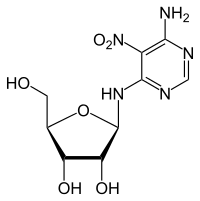Clitocine
Clitocine is a mushroom nucleoside isolate with anticancer activity in vitro.[1][2][3]
 | |
| Names | |
|---|---|
| IUPAC name
(2R,3R,4S,5R)-2-[(6-Amino-5-nitropyrimidin-4-yl)amino]-5-(hydroxymethyl)oxolane-3,4-diol | |
| Identifiers | |
3D model (JSmol) |
|
| ChemSpider | |
PubChem CID |
|
CompTox Dashboard (EPA) |
|
| |
| Properties | |
| C9H13N5O6 | |
| Molar mass | 287.232 g·mol−1 |
Except where otherwise noted, data are given for materials in their standard state (at 25 °C [77 °F], 100 kPa). | |
| Infobox references | |
References
- "Anti-proliferative effect of clitocine from the mushroom Leucopaxillus giganteus on human cervical cancer HeLa cells by inducing apoptosis". 262 (2). April 2008: 190–200. doi:10.1016/j.canlet.2007.12.013. PMID 18222036. Cite journal requires
|journal=(help) - "Clitocine reversal of P-glycoprotein associated multi-drug resistance through down-regulation of transcription factor NF-κB in R-HepG2 cell line". PLoS ONE. 7 (8): e40720. 2012. doi:10.1371/journal.pone.0040720. PMC 3425549. PMID 22927901.
- "Clitocine targets Mcl-1 to induce drug-resistant human cancer cell apoptosis in vitro and tumor growth inhibition in vivo". Apoptosis. 19 (5): 871–82. May 2014. doi:10.1007/s10495-014-0969-0. PMID 24563182.
This article is issued from Wikipedia. The text is licensed under Creative Commons - Attribution - Sharealike. Additional terms may apply for the media files.